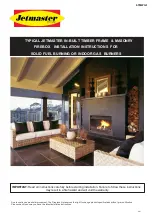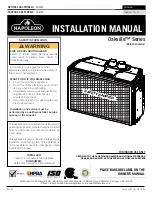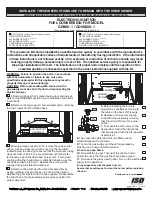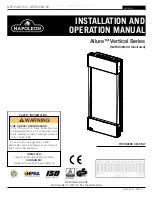
Spectre Module
14
Spectre Module
3
Installation
WARNING
!
Installation
THE INSTALLATION OF THIS APPLIANCE MUST BE CARRIED OUT AS PER THIS
MANUAL AND THE FLUE MANUFACTURER’S SPECIFICATIONS.
WE RECOMMEND THAT YOU USE A QUALIFIED INSTALLER TO CARRY OUT
THE INSTALLATION.
If you have any other enquiries, please contact the dealer from whom you
purchased your heater.
THIS APPLIANCE WEIGHS IN EXCESS OF 220 KILOGRAMS. EXTREME CARE
SHOULD BE TAKEN WHEN HANDLING THE APPLIANCE.
AF Gason Pty. Ltd. accepts no liability whatsoever for any interpretation of AS/NZS 2918:2001.
It is important you understand these installation instructions and minimum clearances to combustible materials before
selecting a position for your Jindara Spectre to ensure safe and correct installation is achieved.
Installation permit
Depending on your local authority requirements, a permit may be required for the installation of your heater. It is your
responsibility to arrange the same.
Flue requirements
As per the dimensions in Figure 1, the Jindara Spectre can be installed with a Perforated 7” Default Flue Kit, or Figure 2,
a Solid 7” Default Flue Kit. In both instances, an additional 8” solid flue must be fitted between the inner flue and outer
flue, to the height of the ceiling if any part of the unit is to be installed less than 1200mm from a heat sensitive surface.
The flue system installed with the Jindara Spectre must comply with Australian and New Zealand installation
standards AS/NZS 2918:2001, and be installed to the flue manufacturer’s instructions.
The performance of your Jindara Spectre is highly reliant on an effective flue system. In many cases poor start-up, dirty glass,
down draft which causes smoking when the door is open, and a reduction in heat outupt can all be related to the flue system
being too short, or incorrect installation. Too tall a flue can result in excess draft and short burn times along with excessive
heat output.
Clearance to combustibles
The Jindara Spectre module heater conforms to AS/NZS 2918:2001 when positioned in relation to combustible surfaces
as shown in Figures 1 & 2 on the following page. All dimensions used in this document are in millimetres and are minimum
unless otherwise stated.
These dimensions in Figures 1 & 2 state the minimum distance the Jindara Spectre can be placed in relation to any
combustible materials - plaster, wallpaper, timber, MDF, etc.
In the instance your Jindara Spectre is surrounded by non-combustible materials - brick, stone, concrete, cement sheet,
villaboard or similar, wall clearances can be reduced to 50mm. A 50mm clearance is required to ensure room air can
circulate around the wood heater during operation.
For additional clearance details, or to access the Jindara Spectre Freestanding Conformance Certificate, please contact the
Jindara Dealer from whom you purchased your heater.
Hearth & floor requirements
If the Jindara Spectre will be installed onto a non-combustible floor such as a brick, stone or concrete slab with tiles, etc.
which is at least 32mm thick, and extends at least 570mm in front of the appliance base at each door, a hearth or floor
protector may not be required.
If the Jindara Spectre is to be installed onto a combustible floor, a minimum 32mm Bellis Board, or similar non-combustible
hearth or floor protector must be placed in between the appliance and the combustible floor. At a minimum, the floor
protector must extend570mm in front of the appliance base in both directions, with a minimum overall depth of 1890mm.
The protector must be at least 940mm wide.
Firewood
Getting the most out of your firewood
Firewood is a sustainable source of energy and when used correctly can provide a cost effective form of heating in your
home. Too often poor heating results and operational issues are attributed to using unseasoned wood which leads to
excess smoking, causing creosote buildup and dirty glass. Wood should be stored in a dry place where good ventalition is
available. Freshly cut wood should be stored for between 12-24 months before burning.
Use only hardwood with your Jindara Spectre.
Thermal efficiency
A wood’s efficiency does not depend only on its type, but also on its moisture content as well as the temperature of the
combustion chamber. To achieve a greater efficiency and longer burn cycle out of your Jindara Spectre, without the emissions
of hazardous particulates, your wood must be well seasoned.
Ideally, wood should not be burnt when its moisture content is above 20%. A moisture meter to measure moisture content
is a handy addition.
0% moisture
100% thermal efficiency
10% moisture
88% thermal efficiency
30% moisture
63% thermal efficiency
50% moisture
39% thermal efficiency
An example of available thermal efficiency for a piece of wood as a fuel source at varying moisture levels.
The combustion process of burning wood
When wood is heated up to approximately 100 degrees celsius, moisture begins to evaporate from the fuel. There is no
heating value from the wood at this point. As moisture releases from the wood, it reduces the efficiency of the combustion
process robbing heat energy from the wood. This demonstrates the importance of dry and well seasoned wood.
As firebox temperatures reach 250-300 degrees celsius, wood solids begin to break down and release volatile gases which
ignite and produce heat.
From 300+ degrees celsius, the main energy available from wood is released when fuel vapors containing up to 60% of
the wood’s potential heat is released.
Understanding combustion principles and learning how to manipulate various conditions surrounding the operation of
your Jindara Spectre enables you to achieve maximum comfort and efficiency from your Australian made wood heater.
Figure 13


























